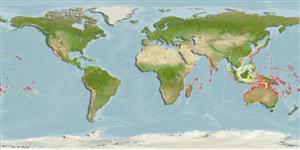Malacostraca |
Decapoda |
Dynomenidae
Environment: milieu / climate zone / djupintervall / distribution range
Ekologi
; djupintervall 0 - 40 m (Ref. 96667). Tropical
Indo-Pacific: from Madagascar to the French Polynesia.
Length at first maturity / Size / Weight / Age
Könsmognad: Lm ? range ? - ? cm Max length : 2.9 cm CW hane/ej könsbestämd; (Ref. 3175); 3.23 cm CW (female)
Feeds on organic particles on the surface of corals (Ref. 129713).
Life cycle and mating behavior
Könsmognad | Reproduktion | Lek | Eggs | Fecundity | Larvae
Members of the order Decapoda are mostly gonochoric. Mating behavior: Precopulatory courtship ritual is common (through olfactory and tactile cues); usually indirect sperm transfer.
McLay, C.L. 2001 Dynomenidae and Dromiidae (Decapoda, Brachyura) from Guam, Philippine Islands, Tonga and Samoa. Zoosystema 23(4):807-856. (Ref. 3175)
IUCN Red List Status
(Ref. 130435: Version 2025-1)
CITES status (Ref. 108899)
Not Evaluated
Not Evaluated
Threat to humans
Harmless
Human uses
| FishSource |
Verktyg
Ytterligare information
Population dynamicsTillväxt
Max. ages / sizes
Length-weight rel.
Length-length rel.
Length-frequencies
Mass conversion
Abundans
PhysiologySyreförbrukning
Human RelatedStamps, coins, misc.
Internet-källor
Estimates based on models
Preferred temperature
(Ref.
115969): 24.4 - 28.8, mean 27.4 (based on 380 cells).
Fishing Vulnerability
Low vulnerability (10 of 100).
